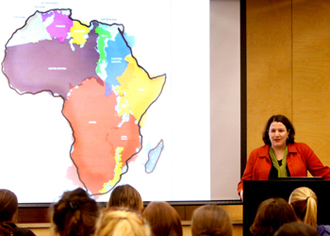"Why Africa?"
When the Tulane Mortar Board Honors Society invited Elisabeth McMahon to give a “last lecture,” the assistant professor of history decided to address the one question she's asked the most: “Why Africa?” What people are really asking, she said, is “why would a white girl from Ohio focus her teaching and research on the history of Africa and black people?”

For her “last lecture” on Nov. 14 in the Lavin-Bernick Center on the uptown campus, Elisabeth McMahon discusses how she views Africa as a mirror that reflects unaddressed problems in American culture. (Photo by Sabree Hill)
Then, laughing, McMahon added, “They never ask me, 'Why history?'”
Each semester, the honor society asks a faculty member, “If you had one last lecture to give, what would it be?” McMahon specializes in East African history, with a particular focus on slavery, emancipation identity formation and gender among coastal Islamic communities.
She went to Africa for the first time in 1998. There she was confronted by her own whiteness and became more aware of entrenched cultural inequalities.
McMahon said she has the same motivation as many students on the Tulane campus today the desire to make a difference and to right wrongs.
Acknowledging that the “last lecture” should be inspiring, McMahon highlighted three lessons she's learned and would like to pass along to students:
⢠Everyone can do something every day to make a difference. Make a consistent commitment to one particular cause.
⢠We have to rethink how we respond to crises and think bigger. Systemic inequalities require changes to the system.
⢠While one person may not be able to make that change, a million people individually taking action can.
“Why do I think Africa is so important?” McMahon asked as she concluded. “Because it is a mirror of the U.S. It reflects back our attitudes and problems that we haven't addressed yet in our own society.”
